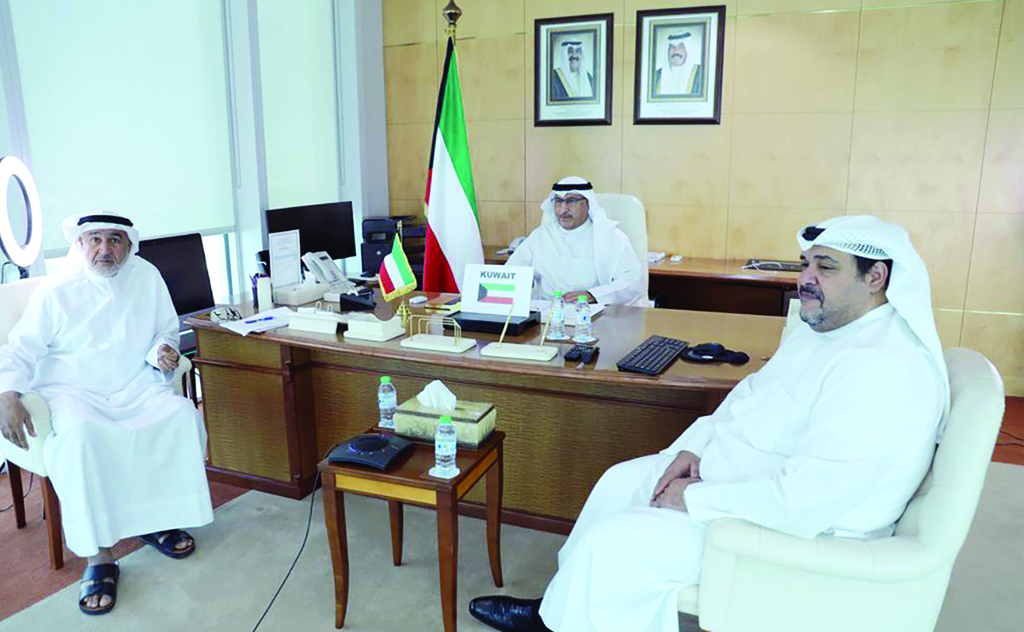KUWAIT: Kuwait's Deputy Prime Minister, Oil Minister and Minister of State for Cabinet Affairs Dr Mohammad Al-Fares on Wednesday underscored the need for cooperation and coordination among all producers to face any challenges or impacts on the supply of oil markets.
This was in a press statement issued by the Ministry of Oil after Al-Fares headed the delegation of Kuwait to the 43rd meeting of the Joint Ministerial Monitoring Committee (JMMC) of the Organization of the Petroleum Exporting Countries and allies including Russia (OPEC+), along with the 31st ministerial meeting of OPEC+, which were held via videoconference.
OPEC+ will enter a new phase of cooperation to effectively manage the oil markets and play a greater role during the upcoming period, he said. He expressed his sincere condolences over the death of the Former Secretary General of OPEC Mohammad Barkindo - noting his time over the past years in leading the organization and the efforts he made in bringing the views of member states closer.
He congratulated the Secretary General of OPEC Haitham Al-Ghais, who assumed his duties yesterday, wishing him success on the upcoming period in supporting and encouraging cooperation among member states, as well as unifying efforts to create more stability in the oil markets. He commended the role of OPEC+ in contributing to the stability of markets and the security of supply effectively, stressing that OPEC+ is a major element in the market that must be preserved for the benefit of all.
Al-Fares reiterated Kuwait's full commitment to the agreed production quotas, commending the OPEC+ decision to increase supplies on September by 100,000 barrels per day, becoming a positive indicator of market support, as Kuwait's share for September will be at 2.818 million bpd. The Kuwaiti delegation to the two meetings included the OPEC Governor Mohammad Al-Shatti and the National Representative of Kuwait to OPEC Sheikh Abdullah Sabah Salem Hamoud Al-Sabah.
Meanwhile, the OPEC+ oil cartel agreed to a small increase in production Wednesday, likely disappointing US President Joe Biden who lobbied for a big hike to tame soaring energy prices on a recent trip to Saudi Arabia. The cartel led by Saudi Arabia and Russia decided to raise production by 100,000 barrels per day for September, much lower than previous increases, according to a statement issued after a ministerial videoconference.
Oil prices had fallen earlier this week but they rose more than one percent on news of the OPEC+ decision, with the main international contract, Brent, climbing back above $100 per barrel. "The smallest increase in OPEC+ history will do little to help the ongoing global energy crisis," Edward Moya, analyst at OANDA trading platform, told AFP.
"Oil looks like it will still remain stuck around the $100 barrel level even as the global economic slowdown accelerates. The Biden administration will not be happy and this will be a setback in improving US-Saudi relations," Moya said. With energy prices soaring following Russia's war in Ukraine, Biden made a controversial trip to Saudi Arabia in July in part to convince the kingdom to loosen the production taps to stabilize the market and curb rampant inflation.
Biden said after his meetings with Saudi officials that he was "doing all I can" to increase the oil supply. But OPEC+ includes Russia, put Saudi Arabia in a tight spot between Washington and Moscow. "A 100,000 barrel per day output hike is a pittance," said Han Tan, chief market analyst at Exinity. "It's likely that the Biden administration will feel let down, considering its overtures to Saudi Arabia have yielded scant results, at least this time around," Tan said.
Western lobbying
Biden is not the only Western leader to have lobbied bin Salman. French President Emmanuel Macron hosted him last week in Paris, with Macron's office saying the two leaders agreed to work "to ease the effects" of the Ukraine war. Before resigning as British prime minister, Boris Johnson had also visited bin Salman in Riyadh in March to plead for higher oil production.
After cutting production in 2020 in response to falling prices during the COVID pandemic, OPEC+ agreed to raise its quotas last year as demand rebounded. OPEC+ began to add around 400,000 barrels per day to the market last year, renewing the policy every month until June. It upped production by almost 650,000 bpd in July and August. Its output is supposed to have returned to pre-COVID levels after cuts totaling 9.7 million bpd-but only on paper, as some members of the 23-nation group have struggled to meet their quotas.- Agencies











